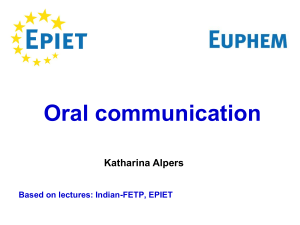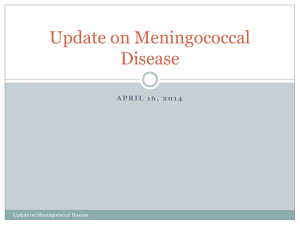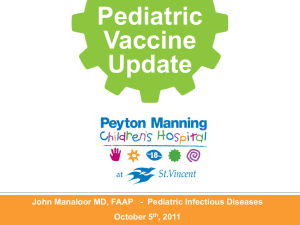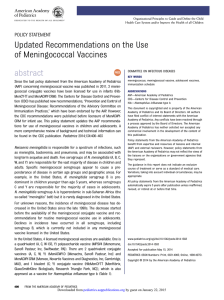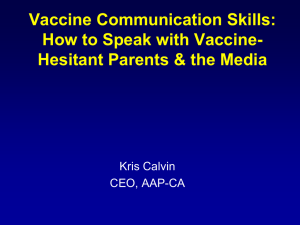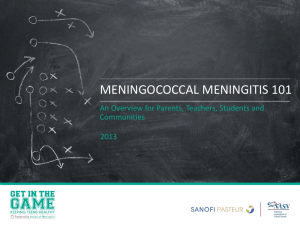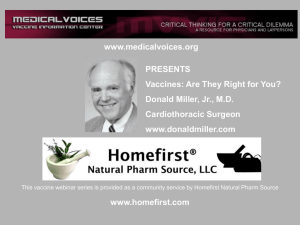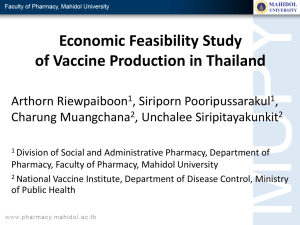Conjugate Vaccines - Immunize Canada
advertisement
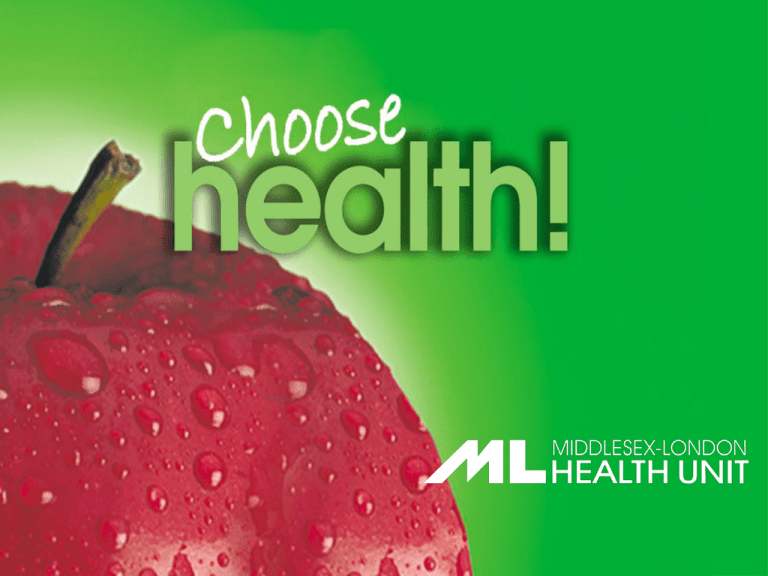
1 Meningococcal Vaccines The Journey Continues Canadian Public Health Association Conference June 19, 2011 Bryna Warshawsky, Associate Medical Officer of Health 519-663-5317 ext. 2427; bryna.warshawsky@mlhu.on.ca 2 Outline • Background • Epidemiology • Journey – Polysaccharide vaccines – Conjugate C vaccines – Conjugate quadrivalent vaccines – Meningococcal A vaccine – Meningococcal B vaccines 3 Background 4 Meningococcal Disease • Neisseria meningitidis • Gram negative diplococci • Thirteen different serogroups, classified by their polysaccharide (sugar) capsule • Most common A, B, C, Y, W135 and X 5 Meningococcal Disease • Causes: – meningitis - inflammation of the lining brain – meningococcemia - in the blood – Disseminated intravascular coagulation (DIC) • Presents as fever, headache, vomiting, stiff neck, photophobia and petechial rash • Fatal in approximately 10% • Long term sequelae 10 - 20% such as hearing loss, amputation or neurologic 6 Immunogenicity • Vaccines authorized based on immunogenicity, not efficacy • Correlate of protection • Serum bactericidal antibody (SBA) titre – Dilution of serum able to kill meningococcal bacteria in vitro; requires the addition of complement – Using human complement correlate is ≥1:4 – Measure: • Percent achieving titre • Geometric mean titre 7 Protection • Circulating antibody titre • Immune memory – May be too slow for post-exposure protection • Herd immunity 8 Epidemiology 9 Meningococcal by Year and Serogroup Source: NACI Statement, August 2009 Meningococcal Epidemiology • 2006: – 210 cases in Canada – Serogroup C 43 cases – Serogroup B 113 cases – Serogroup Y 27 cases – Serogroup W135 6 cases – Serogroup A 2 cases – Other 19 cases 0.13/100,000 0.34/100,000 0.08/100,000 0.02/100,000 0.01/100,000 NACI Statement, CCDR, Volume 35 • ACS-3 April 2009 11 Serogroup B Meningococcal Disease by Age, Canada, 2006 Source: NACI Statement, April 2009 7 6 Rate per 100,000 5 4 3 2 1 0 <1 1-4 5-9 10-14 15-19 Age 20-24 25-64 65+ Serogroup C Meningococcal Disease By Age, Canada, 2006 Source: NACI Statement, April, 2009 0.7 0.6 Rate per 100,000 0.5 0.4 0.3 0.2 0.1 0 <1 1-4 5-9 10-14 15-19 Age 20-24 25-64 65+ Serogroup Y Meningococcal Disease by Age, Canada, 2006 Source: NACI Statement, April 2009 0.25 Rate per 100,000 0.2 0.15 0.1 0.05 0 <1 1-4 5-9 10-14 15-19 Age 20-24 25-64 65+ Serogroups C, B and Y Meningococcal Disease by Age Canada, 2006 Source: NACI Statement, April 2009 7 6 Serogroup C Serogroup B Serogroup Y Rate per 100,000 5 4 3 2 1 0 <1 1-4 5-9 10-14 15-19 Age 20-24 25-64 65+ The Journey 16 Meningococcal A Quadrivalent conjugate A, C, Y and W135 Conjugate C Polysaccharide A, C A, C, Y, W135 1960 1980 2001 2006 2010 Meningococcal B Polysaccharide Vaccines 18 Hyporesponsiveness-Polysaccharide Vaccines 35 First dose 30 Booster dose 25 Boosting GMT 20 15 10 Hyporesponsive 5 0 1 2 3 4 5 6 Time 7 8 9 10 11 NACI Recommendation – Polysaccharide Vaccine – asplenic patients, sickle cell disease – complement deficient, properdin or factor D deficiency – travellers e.g. Hajj, Mecca, Saudi Arabia – laboratory workers who handle meningococcal specimens – military – close contacts of serogroups A, C, Y, W135 – outbreaks of serogroups A, C, Y, W135 21 Conjugate C Vaccines 22 Conjugate Vaccines • Sugar linked to a protein – diphtheria toxoid – diphtheria toxoid mutant – CRM 197 – tetanus toxoid • T cell dependent • Works in young children • Decreases carriage leading to herd immunity • Boostable response 23 NACI Recommendations Meningococcal C conjugate • Routine program: – 2 months to 4 year olds – adolescents – young adults – consider for 5-10 year olds • Post exposure for serogroup C • Outbreaks serogroup C NACI; CCDR, 2001; 27:2-36 25 Geometric Mean Titres Vaccinating 12-18 month olds 600 500 GMTs 400 4-6 weeks postvaccination 6 months postvaccination 300 200 100 0 Menjugate Meningitec NeisVacC Richmond P et al. The Journal of Infectious Disease; 2001; 183:160-3 Titres >1:8 Vaccinating 12-18 month olds 120 100 4-6 weeks postvaccination 6 months postvaccination Percent 80 60 40 20 0 Menjugate Meningitec Richmond P et al. The Journal of Infectious Disease; 2001; 183:160-3 NeisVacC Quadrivalent Conjugate A, C, Y, W135 31 Conjugate A, C, Y, W135 • MenactraTM (sanofi pasteur) – diphtheria toxoid – Authorized for use May 2006 – Authorized for ages 2 – 55 years – Not very immunogenic in infants • MenveoTM (Novartis ) - mutant diphtheria toxoid CRM197 – – – – Authorized for use May 2010 Mix lyophilized A with liquid C, Y, W135 Authorized for ages 11-55 years Has been shown to be immunogenic in infants 32 NACI Recommendation • asplenic patients, sickle cell disease • complement deficient, properdin or factor D deficiency • travellers e.g. Hajj, Mecca, Saudi Arabia • laboratory workers who handle meningococcal specimens • military • close contacts of serogroups A, Y, W135 • outbreaks of serogroups A, Y, W135 • primary antibody deficiencies 33 • HIV positive - consider NACI Recommendation Adolescent Vaccination • Meningococcal C conjugate or quadrivalent conjugate vaccines can be used depending on epidemiology and other considerations • Give an adolescent doses even if vaccinated at young age 34 NACI, CCDR, May 2007;33(ACS-3):1-23 NACI, CCDR, April 2009;36(ACS-3):1-40. Adolescents achieving titre of >=1:8 120 100 Menveo Menactra Percent 80 60 40 20 0 A C Jackson LA et al. Clinical Infectious Diseases 2009;49:e1-10 Y W135 C non-inferior; others Menveo superior Adolescents Geometric Mean Titres 100 Menveo Menactra Geometric Mean Titres (GMT) 90 80 70 60 50 40 30 20 10 0 A C Jackson LA et al. Clinical Infectious Diseases 2009;49:e1-10 Y W135 All Menveo superior Effectiveness Data from US MenactraTM • 14 vaccine failures in the US – 8 serogroup C; 6 serogroup Y – Median age at vaccination 18 years (12-20 years) – Mean time from vaccination to disease 395 days (43-1021 day) – 3 underlying conditions – 3 fatal (21% case fatality) • Vaccine effectiveness estimated at 80-85% within 2 – 3 years after vaccination MacNeil et al. Pediatric Infectious Disease Journal, June 2011;30(6):451-455 37 Effectiveness Data from US MenactraTM • Case control study – 108 cases; 158 controls • 78% effectiveness over 5 years of vaccination (95% CI: 29-93%) – Vaccinated < 1 year ago 95% (95% CI:10-100%) – Vaccinated 1 year ago 91% (95% CI:10-101% ??) – Vaccinated 2-5 years ago 58% (95% CI: -72% - 89%) • Waning protection over time 38 ACIP; MMWR; January 8, 2011;60(3):72-76. US Vaccination Recommendation • Adolescents – 11-12 year of age and booster at 16 years • High risk conditions – 2-dose primary schedule – 2 months apart – Booster every five year • Exposure risk (microbiologist, travelers to endemic countries) – 1-dose primary schedule – Booster 3 years later (2-6 years of age) – Booster 5 years later (7 years of age or older) . ACIP; MMWR; January 8, 2011;60(3):72-76 39 Guillain Barré Syndrome (GBS) • Passive surveillance suggested a possible association between GBS and MenactraTM • Two large studies in US using managed care organization data have not found any association • Past GBS no longer needs to be considered a precaution for MenactraTM Presentations by Velentgas and Weintraub to ACIP; June 2010. 41 Provincial Schedules Province Infant / Toddler Adolescent Adolescent Product Men C Conjugate Timing BC 2, 12 months Grade 6 Men C Alberta 2, 4, 12 months Grade 9 Quadrivalent SK 12 months, 4-6 years Grade 6 Men C Quadrivalent Manitoba Ontario 12 months 12 months Grade 4 Grade 7 Men C Quadrivalent Quebec 12 months Catch-up < 18 years Men C NB 12 months Grade 9 Quadrivalent Provincial Schedules Province Infant / Toddler Adolescent Adolescent Product Men C Conjugate Timing NS PEI NF NWT Yukon 12 months 12 months 12 months 2, 12 months; < 5 years Grade 7 Grade 9 Grade 4 Grade 9 2, 12 months Grade 6 Men C Quadrivalent Quadrivalent Men C Quadrivalent if going to school outside Men C University students if not previously vaccinated Nunavut 12 months Grade 9 Canadian Nursing Coalition on Immunization (CNCI) as of April 19, 2011 http://www.phac-aspc.gc.ca/im/ptimprog-progimpt/table-1-eng.php Men C Meningococcal A 44 MenAfriVacTM • Conjugate meningococcal A vaccine for SubSaharan Africa meningitis belt • Meningitis Vaccine Project • Introduced into Burkina Faso, Mali and Niger in December 2010 with dramatic effects • Plans for Cameroon, Chad and Nigeria, then other countries • Given to 1-29 year olds • Cost less than 50 cents per dose • Estimated to prevent 1 million cases and save $300 million over the next decade http://www.meningvax.org/ 45 Meningococcal B 46 Difficulties with Development • Capsule structurally identical to fetal brain cell adhesion molecules – Induce a weak immune response – Could involve production of autoantibodies • Outer-membrane-vesicle vaccine – Strain specific PorA, highly variable across strains – Each outbreak needs its own vaccine – Vaccines incorporate multiple PorAs 47 Reverse Vaccinology • Take the genetic composition of the bacteria • Look for genes that may represent surface exposed proteins • Put into Escherichia coli expression system to make proteins • Mice immunized and antibodies assessed by serum bactericidal antibody (SBA) assay • Best candidate antigens made into vaccine 48 Novartis Vaccine – Bexsero • Factor H binding protein (fHbp) – fusion protein • Neisserial heparin-binding antigen (NHBA) fusion protein • Neisserial adhesin A (NadA) • Outer-membrane-vesicle New Zealand (OMVnz) • Aluminum adjuvant 49 Immunogenicity • Needs to be assessed using serum bactericidal antibody (SBA) assays against various strains that express the target antigens • Evidence showing it is immunogenic at various ages and has an acceptable safety profile Bai et al. Expert Opin Biol Ther 2011 50 Coverage of Strains • Because of the antigenic variation and different levels of expression of the proteins, need to assess how well the vaccine will protect against circulating strains • Meningococcal antigen typing assay (MATS) • ELISA measures cross-reactivity and quantity of the antigen • Correlates with serum bactericidal antibody (SBA) assay Donnelly J et al. PNAS Early Edition 51 Coverage of Strains • Strains exceeded the threshold value for any of the three antigens had a ≥ 80% chance of being killed by SBA • MATS will allow for assessing expected strain coverage in various countries 52 Pfizer Vaccine • Contains two factor H binding proteins, to cover various strains • In Phase II trials 53 The Journey Continues ?? Questions ?? Thank You 54
